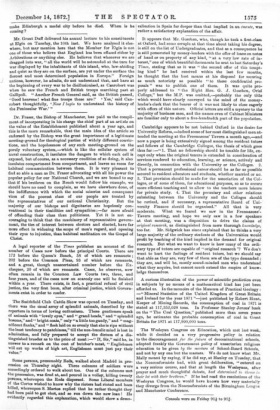Dr. Fraser, the Bishop of Manchester, has paid us the
compli- ment of incorporating in his charge the chief part of an article on the value of the Establishment published about a year ago, and this is the more remarkable, that the main idea of the article so endorsed by the Bishop was the great importance of a legitimate meeting-ground for theological parties of widely different convic- tions, and the hopelessness of any such meeting-ground on the purely voluntary system,—which is like the cellular system of naval construction, it insulates the dangers to which each cell is exposed, but of course, as a necessary condition of so doing, it also insulates compartment from compartment, and leaves no room for habitual communication between them. It is very pleasant to find so able a man as Dr. Fraser advocating with all his power the popular policy for our National Church, and we are bound to say that if his brethren on the Bench would follow his example, we should have no need to complain, as we have elsewhere done, of the indifference with which the social miseries and consequent vices of the poorest class of our people are treated by the representatives of our national Christianity. But the majority of our bishops and dignitaries are hopelessly con- ventional in their timidities and sympathies ;—far more afraid of offending their class than politicians. Yet it is not en- couraging to think that the machinery of representative govern- ment, the ties of interest between electors and elected, have far more effect in widening the scope of men's regard, and opening their eyes to injustice, than habitual meditation on the Gospel of Christ.










































 Previous page
Previous page